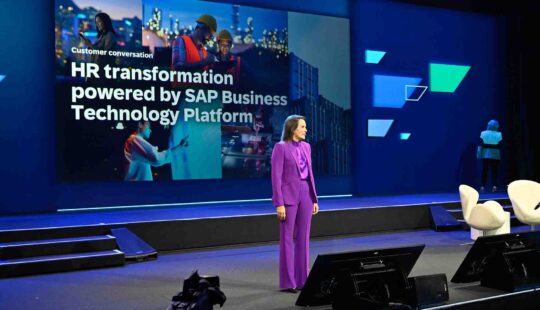Each year when we host SuccessConnect, it takes a village. For several months, a cross-functional group of people from sales, marketing, communications, product, and engineering come together to collaborate and put on an incredible program for our customers. At the end, the group celebrates their success, debriefs, then returns to their “day jobs.”
This is the perfect example of a dynamic team: a group of people with different skills, strengths, and work styles, that work together on a mission-critical initiative, and once the team’s goals are achieved, they disband. Increasingly, this is the way work gets done. Our research found that 82% of employees have participated in a dynamic team more than once in their current organizations.*
Dynamic teams are sometimes the most innovative and productive groups within an organization, creating important networks and lasting impact. However, with today’s human capital management (HCM) systems, these teams – and their value – are hidden.
Consider what happens today when a leader needs to assemble a team for an important, high-visibility project. They’re likely to pull in people they already know. But is this the best way to optimize both initial results and long-lasting effects? Does this serve diverse populations that may be hidden themselves?
With dynamic teams hidden from view, organizations lack insight into how work is allocated, how to optimize and replicate results, and how well capabilities are building. Meanwhile, employees are not getting recognition for the skills they are gaining and the results they are delivering. And within the dynamic teams themselves, leaders and team members lack the visibility into what each person brings to the table and how they can most effectively work together.
This lack of transparency is holding us back in our pursuit of personal and organizational sustainability and adaptability.
The Next Chapter for HXM: Dynamic Teams
Today at SuccessConnect, we announced the delivery of SAP SuccessFactors Opportunity Marketplace, backed by our center of capabilities, as the foundation for bottom-up learning, skilling, and self-development. It is an ever-evolving platform that extends beyond the traditional matching capabilities of HCM software to support a range of opportunities, from learning content and mentor relationships to temporary assignments and career roles, curated around an individual’s whole self — who they are today and who they are becoming.
But we are not stopping there. We believe that dynamic teams are the pinnacle of opportunities. Just think about when you experienced your most significant growth – was it when you were holed up in your office studying or when you were surrounded by a team working together on an audacious goal? It was most likely the latter. Our research found that when an employee participates on a dynamic team, more than 70% of their line managers report a positive impact on their career development and engagement.
Today, we shared our vision to bring dynamic teams to the forefront of human experience management (HXM). With HXM technology to support dynamic teams, organizations can identify, track, measure and optimize the outcomes of these hidden groups, and individuals can access broader development and networking opportunities.
The benefits of elevating the power of teams include:
- Diversity and inclusion: By making dynamic teams and the roles within them transparent, organizations can open opportunities to a broader set of colleagues. With data and insight into diversity of thought, strengths and backgrounds, they can assemble teams with balance and belonging.
- Trackable investments: Understanding where and how work is being done, organizations can gain greater insights into what and who is driving innovation and agility throughout their business.
- Sustainable development and transformation: Participating in a cross-functional team helps people acquire new skills and strengthen their network. This growth benefits their “day jobs” by fostering ongoing adaptability and development. In turn, organizations can accelerate broad transformation initiatives that rely on the network effects of cross-functional skill development and behavioral change.
- Health and prosperity: With a better understanding of who we are as individuals and what we can bring to a team, along with greater empathy and understanding of our teammates and how best to work together, we can optimize team dynamics. Not only does this help deliver tremendous results, but it also helps people have more fun in doing so.
Human experience management is about putting people at the center of business. With our introduction of SAP SuccessFactors Opportunity Marketplace and the center of capabilities this year, and dynamic teams next year, we are reshaping the way we work and grow – as organizations and as humans. So together, we can change work for good.
Our journey to bring our HXM vision to life would not be possible without the hundreds of customers who have partnered and co-innovated with us. To get involved, visit the SAP SuccessFactors Community page.
Learn more about dynamics teams by tuning into SuccessConnect and reading our current research on SAP SuccessFactors Community.
Amy Wilson is senior vice president of Products and Design for SAP SuccessFactors.
*Based on a survey of 1,492 dynamic team-members and line managers globally, conducted by the SAP SuccessFactors HR Research Team (March, 2021).



